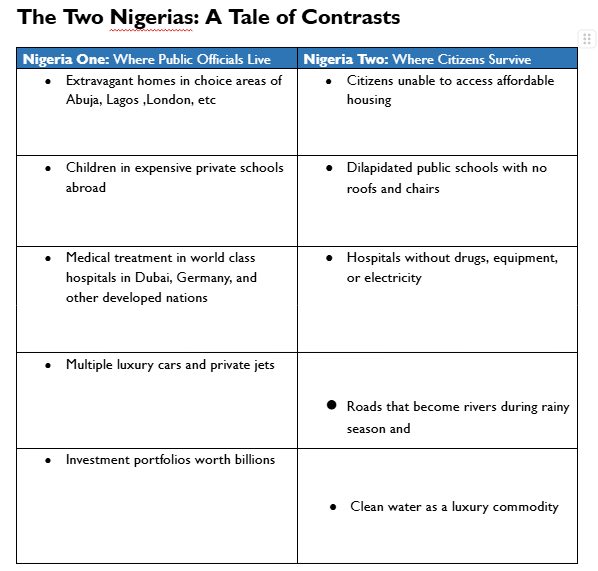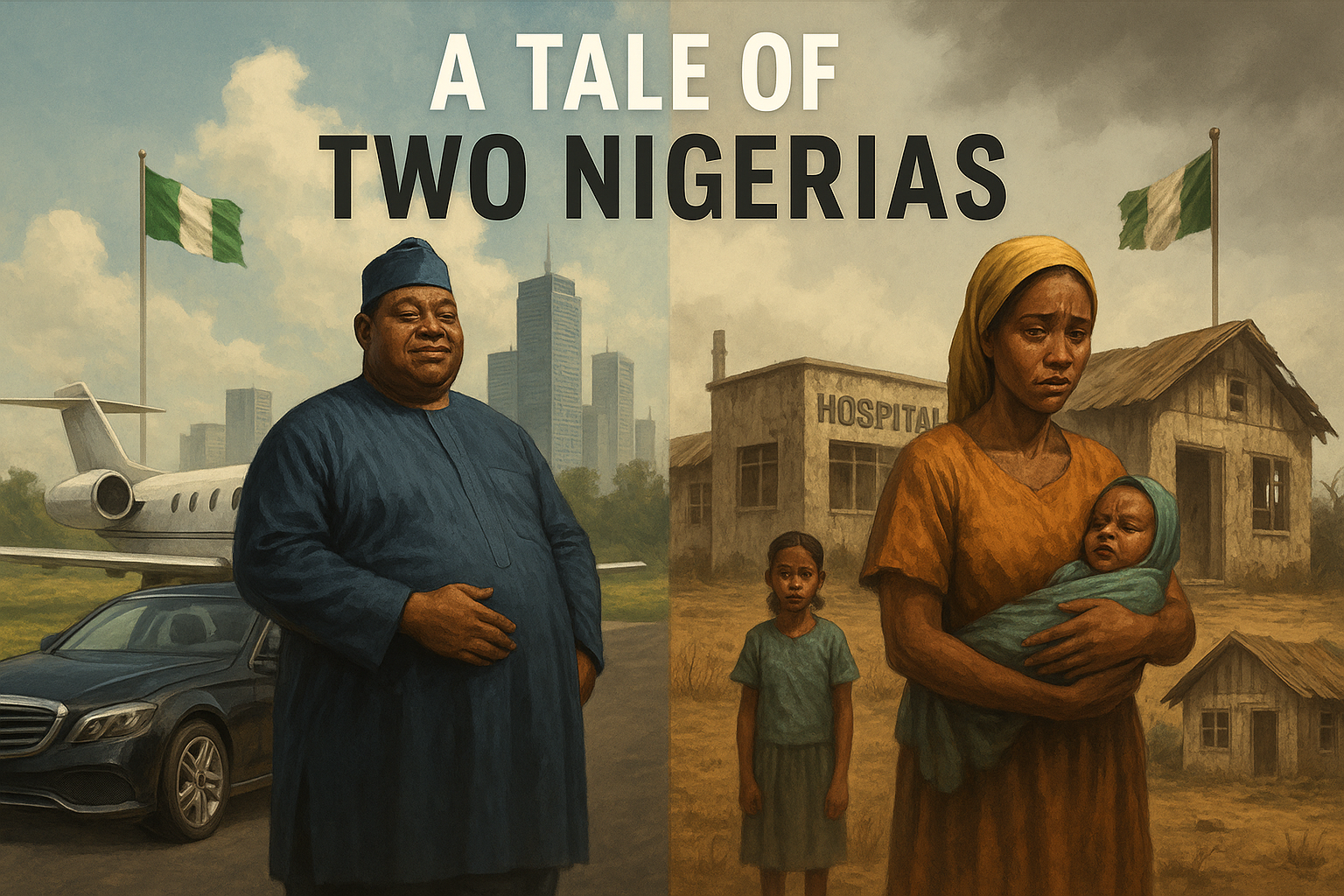This piece is a tale of two Nigerias, one where public contracts mint billionaires, another where citizens die waiting for the hospitals and other infrastructures that were never built.
Every June 12, Nigeria celebrates Democracy Day. Politicians make speeches about progress and development. Citizens wave flags and sing the national anthem but underneath the celebration lies a bitter irony. The same democratic institutions designed to serve the people have become the most efficient wealth extraction machines in modern history. Legislators who swore to protect public funds treat the national treasury as their personal ATM. Our democracy has been on a vicious cycle that encapsulates various challenges including legislators stealing development funds, infrastructure remaining underdeveloped, corrupt leaders staying in power, prevalence of multidimensional poverty, desperate citizens becoming more and more vulnerable to vote-buying across elections cycles, amongst others. These issues continue to fuel citizens apathy to democratic governance and the cycle continues.
The Economic and Financial Crimes Commission (EFCC), an institution whose mission is to eradicate economic and financial crimes through prevention, enforcement and coordination reported to have handled 69% of major corruption cases, securing about 3,500 convictions between October 2023 and October 2024. The number looks impressive until you realise that in over 400 convictions over ten years, only about four members of the political class have been successfully prosecuted. Why? The obvious answer is, the system protects its own at the detriment of the people it ought to serve. When a legislator is accused of corruption; cases drag on for years, evidence mysteriously disappears, witnesses develop sudden amnesia, court proceedings face endless adjournments, some end up fainting or announcing sudden health conditions even when convicted, appeals can last decades. Meanwhile, the stolen billions remain unrecovered, and new capital projects create fresh opportunities for theft.

The distance between these two Nigerias is measured not in kilometers, but in stolen billions. Every luxury car in Nigeria One represents a classroom without desks in Nigeria Two. Every private jet represents a hospital without an ambulance.
The Mathematics of Misery
Picture this: A ₦30 billion hospital construction contract lands on the desk of a state government. By the time the dust settles, here's what typically happens in Nigeria's corruption ecosystem:
Scenario 1: The Kickback Calculation:
Original contract: ₦30 billion
"Settlement" to approving officials: ₦6 billion (20%)
Actual construction budget: ₦24 billion
Substandard materials and shortcuts: ₦12 billion saved
Net profit to contractor and accomplices: ₦18 billion
From one contract, Nigeria has just minted at least 6 new billionaires: the contractor, two key government officials, and three influential "middlemen." Meanwhile, the hospital that was supposed to serve 500,000 people becomes a death trap with substandard equipment, faulty wiring, and walls that crack within months.
Scenario 2: The ₦40 Billion School Infrastructure Project
Official Story: "Building 200 modern classrooms across the state."
Reality Check:
Each classroom budgeted at ₦200 million
Actual construction cost: ₦50 million per classroom
Money stolen per classroom: ₦150 million
Total theft: ₦30 billion from 200 classrooms
Human Impact:
Students still learn under trees
Teachers have no proper facilities
Parents lose hope in public education
The cycle of poverty continues
Although the above examples are case scenarios, they mirror the daily reality of Nigeria's capital projects sector, the nation's most fertile breeding ground for corruption.
Real Stories Behind the Statistics
Habiba Usman(Not real name), 34, has been in labor for 18 hours at the "ultra-modern" maternity ward in a particular State. The generator that powers the delivery room died three hours ago. The backup generator was never connected because those funds disappeared into someone's account two years ago.
In the darkness, using the flashlight from her phone, the Dr. performs what should be a routine delivery. This is the same hospital that was commissioned with fanfare in 2019, its opening ceremony attended by governors and ministers who praised the "world-class facility. What they didn't mention was that the ₦8 billion allocated for equipment was split between the contractor and approving officials. The incubators? Purchased at ₦50 million each when the global market price was ₦15 million. The difference? New houses in Abuja for the procurement committee.
Grace is a brilliant 16 year old in Edo State. Her local secondary school was allocated ₦500 million for a new science laboratory in 2020. The money disappeared. Grace studies chemistry without ever conducting a single experiment.
She does not understand why her textbooks describe equipment she has never seen. What she does not know is that the ₦500 million is now luxury cars in the garages of education officials. Her dreams of becoming a doctor grow dimmer each day in a classroom without functioning windows, let alone laboratory equipment.
Habiba's baby didn't make it, Grace was unable to pass her exams and had to switch courses . Their stories joins thousands of other victims of contracts that create billionaires instead of saving and improving lives.
An analysis by HEDA resource centre reveals the shocking arithmetic of legislative corruption in Nigeria:
The Political Class Corruption Scorecard (2007-2023):
Former Governors: 12 major cases
Former Ministers and Advisers: 12 major cases
Senators: 7 major cases
Total amount involved: ₦356.18 billion ($36.36 billion)
These 31 cases involving legislators represent nearly one-third of all major corruption prosecutions. Think about that: the very people elected to serve Nigerians are responsible for stealing one-third of all major corruption proceeds.
But here's where it gets truly devastating, this ₦356.18 billion represents just the tip of the iceberg. These are only the cases that made it to court. Experts estimate that for every corruption case prosecuted, at least five others go undetected or unreported.
The Multiplier Effect of Stolen Development
The funds tied up in corruption cases could have transformed Nigeria into a completely different nation, one where world-class primary healthcare centers bring medical care to marginalised communities, where existing hospitals are equipped with modern life-saving machines, and where thousands of healthcare workers receive proper training. This stolen development potential extends to educational transformation through modern classrooms that could accommodate tens of thousands of students, science laboratories that give students hands-on learning experiences, and digital learning centers that bridge the technology gap in rural areas. Infrastructure development could have delivered thousands of kilometers of quality roads connecting farmers to markets, massive power generation capacity that ends blackouts for millions, and clean water systems that prevent waterborne diseases across hundreds of communities. The economic opportunities lost are equally huge, small business loans that could create jobs and wealth for hundreds of thousands of entrepreneurs, agricultural processing centers that add value to farm produce, and technology hubs across multiple states that could nurture Nigeria's digital economy and position the country as a leader in innovation and development.
The Urgent Call for Action
As Nigeria marks another Democracy Day, we must confront an uncomfortable truth: our democracy is being hijacked by those elected to protect it. The billions in unresolved corruption cases is not just money, it is stolen futures, deferred dreams, and lives lost to preventable causes.
What We need to do:
Fast-track corruption trials : no more decades long court cases
Asset recovery and deployment : recovered funds must immediately go to development projects
Public project transparency: real-time tracking of every naira spent on capital projects
Citizen oversight: communities must monitor projects in their areas
Electoral consequences: corrupt legislators must face voters' judgment
Every time we vote for a candidate with unresolved corruption cases, we become accomplices to our own suffering. Every time we fail to demand accountability, we enable the Nigeria one to keep running.
The children being born today deserve a Nigeria where:
Public contracts build infrastructure, not private wealth
Hospitals save lives instead of killing patients
Schools educate students instead of enriching contractors
Roads connect communities instead of lining pockets
This Democracy Day, let us make a choice. Let's choose the Nigeria where Amina's baby survives because the hospital has functioning equipment. Where Grace becomes a doctor because her school has a working laboratory. The Nigeria One has operated long enough. It is time to shut it down and build the Nigeria we all deserve.
The question is not whether we can afford to fight corruption. The question is whether we can afford not to.
Happy Democracy Fellow Nigerians!

